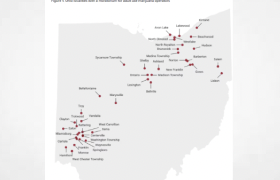Cannabis startups are on the rise, with more than a dozen countries already legalizing marijuana and others offering relaxed to stringent laws for medical or recreational cannabis consumption.
The global cannabis market is expected to grow by 162% by 2026. So in the next five years, the cannabis industry is likely to become a $55.9 billion industry.
Because the market has a lot of room for innovation and growth, support from investors is helping drive the development of innovative startups in the industry. But investments depend on a good cannabis cultivation business plan.
Why do Cannabis Startups Need a Solid Business Plan
Even though the industry is in a growth phase and investors are showing interest, there are certain factors they consider before making an investment decision.
The business plan is a blueprint of what the business idea is, where it aims to be in the future, and what path it will take to reach there. A clear and solid business plan is the key to unlocking investments and taking your cannabis startup to the next level.
Here are the elements of a solid business plan and why they are necessary:
1. A Sellable Story
To start, a story is a best and most convincing way to illustrate the business’s potential.
A good business plan has a sellable story at the core that helps convince investors to make the investment decision.
Startups like Leafly and Weedmaps have gained attention from investors because they presented their innovative idea in the form of believable stories. For instance, in the case of Leafly, it was a story of web developers who developed their own product after recognizing “a need for a legitimate strain resource”.
They then worked hard to bring the picture they sketched to reality, but the business plan was the first step in fueling their financial needs.
2. USP
The Unique Selling Proposition or USP is a unique edge to a startup. Since there is huge potential in the cannabis industry, and many opportunities, the competition for securing investments is also high.
In this case, it is essential to stand out and a thorough business plan that aptly highlights your innovativeness is necessary to get the finances you need.
3. Outlining the Gaps in the Industry
Another component of the sellable story is identifying the gaps in the cannabis industry. Since the industry has so much scope, you should define a niche that you will be operating in.
If the brand’s aim and vision are vague, it will reduce the believability of your promises, thus thinning your chances of securing a good level of investment.
4. Defining a Strategic Direction
Business plans are not just about the solution that the business aims to offer. It also includes a well-defined strategic direction for attaining the results.
Many cannabis startups opt for consultancy services when drafting their business plan. It helps them to define a strategic direction keeping in mind the errors made by other startups and the success factors of those that survived the toughest first 5 years.
5. Defining the Financial Timeline
The business plan is a clear blueprint of what the business stands for, how it will operate, and the resources that it needs to stay afloat before it starts churning profits. Therefore, defining a financial timeframe is an essential component of a business plan.
Many startups underestimate the funds they need. Since the investors are experts in the industry and have in-depth knowledge before they decide to invest, a sloppy financial plan would highlight a lack of research and knowledge about the industry. This greatly decreases the prospects of securing an investment.
6. Keeping the Investor Perspective in View
If you don’t include the benefit that your audience will gain from your product, you will not be able to get conversions.
Similarly, when it comes to getting an investment from investors, if you don’t clearly define what they benefit from investing in your startup, your business proposal will not be effective.
When it comes to new ventures, investors are typically seeking a 40%-60% of annual compounded return. This return also needs to be backed by profit growth that the startup owners can project. But it varies from industry to industry.
When it comes to the cannabis sector, OGS Capital has experts who have designed business plans for multiple startups in the cannabis industry.
Knowing the industry inside out has its perks and a solid business plan developed by OGS professionals is something that increases the chances of securing investment.
Summing it Up
Entering as a newbie in the industry is challenging. A solid business plan is what helps cannabis startups to secure investment. It shows investors that you’re serious and you have a thorough game plan to make good use of their money.

















